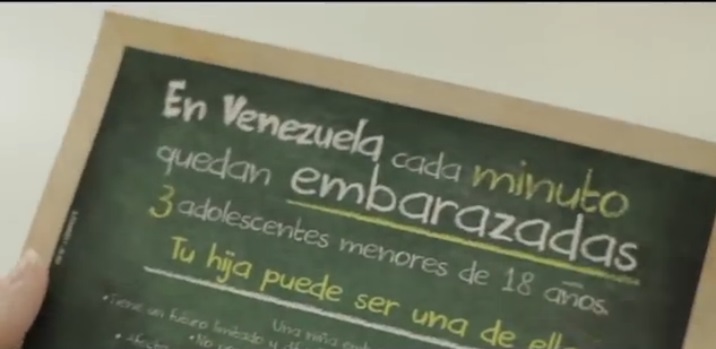
“In Venezuela, every minute three teenage girls under 18 get pregnant. Your daughter could be one of them”. Screenshot from the video of the campaign.
Shop windows are usually home to mannequins dressed in the season's latest fashions, not a shocking display of an uncomfortable truth. But one Venezuelan foundation did just that to raise awareness about the country's high rate of teen pregnancy.
The video by Friends of Children Who Deserve Protection (known as Fundana) begins with the statement, “Shop windows display desires, but when they reveal hidden realities, they cause fear, astonishment and shame.”The camera cuts to a mall where people stop and stare at a shop window, shocked at something not yet revealed to the viewer. Finally, the video reveals the object of people's attention: mannequins dressed as schoolgirls with pregnant bellies.
Every minute, three girls under the age of 18 become pregnant in Venezuela, according to the organization. A 2013 World Bank report found Latin America and the Caribbean was the region with the third highest teenage fertility rate behind Sub-Saharan Africa and South Asia. Venezuela ranks among the top 40 of the list, along with other seven countries in the region. The same document mentions the five regional countries with the greatest success in terms of reducing teenage pregnancy rates during this period: Colombia (-25 percent), Haiti (-23 percent), Costa Rica, El Salvador and Peru (-21 percent).
Fundana's campaign is aimed at parents with teenage children and teens themselves to emphasize the risks of pregnancy at a young age, such as being forced to drop out of school.
The blog Vida como mamá (Life as a mom) reposted the video and wondered:
Qué estamos haciendo nosotras como madres, como familias, para prevenir un embarazo no deseado o una enfermedad de transición sexual. Están nuestras niñas y adolescentes recibiendo la información oportuna y a tiempo de mano de nosotros.
What are we doing as mothers, as families, to prevent an unwanted pregnancy, or a sexually transmitted disease. Are our girls and teenagers getting timely information from us?
Website Panfleto negro (Black flyer) reflected on how people deal with a delicate issue such as teenage pregnancy, given that the video leaves the viewer with the obligation of doing something they might not want to. But it's important that parents and adults take on the issue:
Tampoco es justo pedirle al video que resuelva el problema; bastante ha hecho llevando nuestra atención hacia ese tema tan incómodo. Así que valga este comentario como una de las conversaciones necesarias para continuar la labor iniciada por la campaña.
Neither is it fair to ask the video to solve the problem; it has done enough making us pay attention to this very uncomfortable issue. So, may this remark be one of the necessary conversations that go along with this task that the campaign has launched.
On Twitter, the hashatg #VitrinaVerguenza (showcase of shame) showed a variety of opinions:
Para entender las problemáticas una nación hay que empezar por las cosas básicas #VitrinaVerguenza #Activate https://t.co/r3CrsmiaJr
— Gabriel Dasilva (@g_Dasilva_G) agosto 15, 2014
To understand a nation's problems, we have to start with the basic stuff.
Con #VitrinaVerguenza promovemos que se informe y converse que el embarazo precoz en Venezuela tiene el mayor índice de la región.
— 141 COIMBRA (@141COIMBRA) agosto 15, 2014
With this campaign, we promote information and discussion, as teenage pregnancy rates in Venezuela are the highest in the region.
Some tweets were addressed to parents:
Quieres q tus hijos dejen clases y no se preparen por un descuido? Habla con ellos, que sepan todo del embarazo precoz #vitrinaverguenza
— Jean Paul Garcia (@JeanPaulGarcia) agosto 15, 2014
Do you want your children to drop out of school and not be prepared for the future because they were careless? Talk to them, let them know everything about teen pregnancy.
Other users compared Venezuela's figures with those of other countries:
Países como Colombia, Haití y Perú redujeron en más de 20% los índices de embarazo precoz, ¿qué pasa en Venezuela? #VitrinaVerguenza
— María José (@majoauday) agosto 15, 2014
Countries such as Colombia, Haiti and Peru reduced their teenage pregnancy rates by more than 20%. What about Venezuela?
However, not everyone agreed with the campaign:
“Vitrina verguenza” es una campaña contra la dignidad, a meterle el ojo @MinMujer http://t.co/JFhiIJrCC9
— Karina García (@karinagarciaro1) agosto 14, 2014
“Showcase of shame” is a campaign against dignity, don't miss it.
¿vitrina verguenza? ser mamá joven no tiene nada de vergonzoso estimados venezolanos
— Negra (@Catitamayorga) agosto 20, 2014
Showcase of shame? To be a young mom is nothing to be ashamed of, my dear fellow countrymen.
Panfleto Negro ends up its entry by saying:
Hay, por supuesto, otros temas asociados, como la falta de políticas públicas, o cómo los esfuerzos de prevención del embarazo precoz (y de cualquier cosa en Venezuela) se hacen con las uñas y sin apoyo articulado del gobierno. Como se ve, una gran caja de Pandora que este video, enhorabuena, se ha atrevido a abrir para nosotros.
There are, of course, other issues associated with this, such as lack of public policies, or how those prevention efforts related to teenage pregnancy (as any other thing in Venezuela) are carried out on a shoestring budget and without articulated support from the government. As we can see, a large Pandora's box that this video, congratulations, has dared to open for us.






